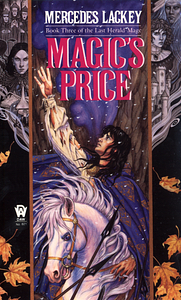Take a photo of a barcode or cover
slow-paced
Plot or Character Driven:
Character
Strong character development:
No
Loveable characters:
Complicated
Flaws of characters a main focus:
Yes
A really disappointing end to an ok-at-best trilogy. I enjoyed the first one enough to try the second, and liked the second one a little more than the first. And then there was the third… What a letdown.
Graphic: Rape
adventurous
dark
emotional
hopeful
sad
medium-paced
Plot or Character Driven:
Character
Strong character development:
Yes
Loveable characters:
Yes
Diverse cast of characters:
No
Flaws of characters a main focus:
Yes
Graphic: Confinement, Death, Rape, Sexual assault, Sexual violence, Suicidal thoughts, Suicide, Terminal illness, Torture, Violence, Blood, Medical content, Grief, Suicide attempt, Death of parent, Murder, Alcohol
Moderate: Animal death, Homophobia
Minor: Infertility, Toxic relationship, Vomit, Religious bigotry
2.5. I would have enjoyed this a lot when I was a teenager, but now I found a lot of it OTT: the romance, the villain, the h/c and so on. It still works if I don't think too much about it, an entertaining enough casual read for a late evening.
I can't with these books. I just can't. I had to give up halfway through the third one because I think I'm too old to be re-reading them, explosive laughter and/or expressions of complete rage are not appropriate for a 7:30 AM commute. Vanyel is so overblown and dramatic all the time, which I realize is sensible enough because he's the Last Herald-Mage, but I prefer literally every other not-actually-evil character in these books to him. Jervis has more character development than Vanyel.
Let that sink in for a moment. Jervis.
Moving on to Mage Winds. I like Vanyel better when he's dead.
Let that sink in for a moment. Jervis.
Moving on to Mage Winds. I like Vanyel better when he's dead.
So far, all three books of the Last Herald-Mage trilogy have been very different kinds of books. Magic's Pawn is a tearjerker romanctic fantasy YA novel. Magic's Promise is more action and mystery, with a touch a family drama. Magic's Price is a political intrigue and romance, with some fantasy adventure toward the latter third or so of the novel. I very much liked all three of them, though for different reasons and for the different sides of Vanyel they showed over the course of his life. All in all I think I liked Magic's Promise the best, but the series on a whole is excellent and one I think I will return to again.
Magic’s Price is the last book in The Last Herald Mage trilogy. Because the first book, Magic’s Promise, introduced us to half a dozen herald mages, it was easy to assume they’d all have to die so Vanyel could be the last one around. And in Magic’s Price, the deaths begin. . .
Vanyel, always overworked, is now stressed because his king is on his death bed. The healers don’t know what ails him and cannot relieve his pain without strong drugs. Then, Vanyel is approached and told of a bard named Stefen who can sing away pain. Doubtful, Vanyel has the seventeen-year-old former street urchin fetched. It works! The king is able to sit up and be alert for court, making everyone feel relief and Vanyel thankful. But Stefen feels something else. Never wealthy, he cares less about royal court and more about how is heart thumps harder when Vanyel is around.
Again, Vanyel is sent home to vacation with his family, this time his aunt, herald mage Savil, and Stefen come with him. But when a blood mage attacks Vanyel on his family’s property, drastic action must happen: Vanyel moves his parents to the capitol, thinking they are safe. The rest of the book details how herald mages are killed surreptitiously, and Vanyel’s rage sends him after the powerful blood mage he has seen in his dreams since Magic’s Pawn, in which Vanyel is defeated on an ice mountain.
When I was sixteen, this book destroyed me so hard that I didn’t pick up another Lackey novel, even though I owned another trilogy. I was too tender-hearted. This time around, I knew more about the heralds hundreds of years after Vanyel’s tale ends, which gave me heart. To know that Valdemar is more organized and the Companions still bond with a Chosen who is trained to be a herald made me feel lighter.
On my first reading 18 years ago, I hadn’t realized that during Vanyel’s time, heralds were seen as ersatz herald mages. Vanyel disagrees with that notion:
The narration is smoother each book, too. Lackey stops italicizing internal monologues and makes proper use of her chosen third-person point of view. As if catching on to how it’s used, she also lets readers into Stefen’s mind, and occasionally Vanyel’s aunt, Savil’s. Too much first-person internal dialogue has driven me batty in the past.
The political intrigue is set up clearly. Not only does a blood mage who plans to destroy Valdemar terrorize Vanyel. Neighboring Karse has a young man who has risen up and declared himself The Prophet and is against mages. Karse seems like it has been and always will be a pain in Valdemar’s arse, regardless of the century. Lackey prevents the Magic’s Price from feeling predictable by acknowledging ongoing political issues beyond the main story line.
She also lightens the story with love. Unexpected romance hits the court and surprises everyone. Also, Vanyel tries to understand bard Stefen, who is always there to help and comfort. The two enjoy each other’s company and find ease in long nights talking and drinking wine, but it’s clear Stefen wants more. Stefen’s love makes Vanyel’s efforts to save Valdemar feel worth it; it’s no longer a place with a faceless population, but a auburn-haired young man who makes beautiful music.
Review originally published (with pics of how I envision Stefen and Vanyel!) at Grab the Lapels.
Vanyel, always overworked, is now stressed because his king is on his death bed. The healers don’t know what ails him and cannot relieve his pain without strong drugs. Then, Vanyel is approached and told of a bard named Stefen who can sing away pain. Doubtful, Vanyel has the seventeen-year-old former street urchin fetched. It works! The king is able to sit up and be alert for court, making everyone feel relief and Vanyel thankful. But Stefen feels something else. Never wealthy, he cares less about royal court and more about how is heart thumps harder when Vanyel is around.
Again, Vanyel is sent home to vacation with his family, this time his aunt, herald mage Savil, and Stefen come with him. But when a blood mage attacks Vanyel on his family’s property, drastic action must happen: Vanyel moves his parents to the capitol, thinking they are safe. The rest of the book details how herald mages are killed surreptitiously, and Vanyel’s rage sends him after the powerful blood mage he has seen in his dreams since Magic’s Pawn, in which Vanyel is defeated on an ice mountain.
When I was sixteen, this book destroyed me so hard that I didn’t pick up another Lackey novel, even though I owned another trilogy. I was too tender-hearted. This time around, I knew more about the heralds hundreds of years after Vanyel’s tale ends, which gave me heart. To know that Valdemar is more organized and the Companions still bond with a Chosen who is trained to be a herald made me feel lighter.
On my first reading 18 years ago, I hadn’t realized that during Vanyel’s time, heralds were seen as ersatz herald mages. Vanyel disagrees with that notion:
“. . .most mages don’t have strong Gifts in anything other than sensing and manipulating magical energy. . . .They won’t be protected against a FarSeer spying on their work — or a ThoughtSenser reading their minds. Or a Fetcher moving something they need for a spell at a critical moment.”You can’t throw magic at everything. And so one of Vanyel’s final goals is to convince the court, the kingdom, and the heralds themselves that heralds’ don’t have to have mage Gifts to be useful — and uses bard Stefen to spread the word. Having better information made me love the book that much more, because it didn’t feel hopeless.
The narration is smoother each book, too. Lackey stops italicizing internal monologues and makes proper use of her chosen third-person point of view. As if catching on to how it’s used, she also lets readers into Stefen’s mind, and occasionally Vanyel’s aunt, Savil’s. Too much first-person internal dialogue has driven me batty in the past.
The political intrigue is set up clearly. Not only does a blood mage who plans to destroy Valdemar terrorize Vanyel. Neighboring Karse has a young man who has risen up and declared himself The Prophet and is against mages. Karse seems like it has been and always will be a pain in Valdemar’s arse, regardless of the century. Lackey prevents the Magic’s Price from feeling predictable by acknowledging ongoing political issues beyond the main story line.
She also lightens the story with love. Unexpected romance hits the court and surprises everyone. Also, Vanyel tries to understand bard Stefen, who is always there to help and comfort. The two enjoy each other’s company and find ease in long nights talking and drinking wine, but it’s clear Stefen wants more. Stefen’s love makes Vanyel’s efforts to save Valdemar feel worth it; it’s no longer a place with a faceless population, but a auburn-haired young man who makes beautiful music.
Review originally published (with pics of how I envision Stefen and Vanyel!) at Grab the Lapels.
This culmination of The Last Herald Mage series is epic and heart-rending as Vanyel finds his life-bond and faces his and Valdemar's worst enemy. I think my favorite thing about this series is that readers can grow with Vanyel, from a whiny 15 year-old to the mature man who pays the ultimate sacrifice. Also the all-around happy ending is poignant, yet only slightly sappy. Loved it!
Summary: Vanyel Ashkevron is the most powerful Herald-Mage in Valdemar and with that power comes a lot of responsibility, including looking after a dying king, and isolation from both his peers and the rest of the court. However, when a chance at love comes along in the shape of Stefan, a young bard, can Vanyel open himself up to this second chance? And how will Valdemar face the future as the Herald-Mages start to die out?
Snack Lit rating: comfort food
Summary: Vanyel Ashkevron is the most powerful Herald-Mage in Valdemar and with that power comes a lot of responsibility, including looking after a dying king, and isolation from both his peers and the rest of the court. However, when a chance at love comes along in the shape of Stefan, a young bard, can Vanyel open himself up to this second chance? And how will Valdemar face the future as the Herald-Mages start to die out?
Snack Lit rating: comfort food
Magic’s Price is the last book in The Last Herald Mage trilogy. Because the first book, Magic’s Promise, introduced us to half a dozen herald mages, it was easy to assume they’d all have to die so Vanyel could be the last one around. And in Magic’s Price, the deaths begin. . .
Vanyel, always overworked, is now stressed because his king is on his death bed. The healers don’t know what ails him and cannot relieve his pain without strong drugs. Then, Vanyel is approached and told of a bard named Stefen who can sing away pain. Doubtful, Vanyel has the seventeen-year-old former street urchin fetched. It works! The king is able to sit up and be alert for court, making everyone feel relief and Vanyel thankful. But Stefen feels something else. Never wealthy, he cares less about royal court and more about how is heart thumps harder when Vanyel is around.
Again, Vanyel is sent home to vacation with his family, this time his aunt, herald mage Savil, and Stefen come with him. But when a blood mage attacks Vanyel on his family’s property, drastic action must happen: Vanyel moves his parents to the capitol, thinking they are safe. The rest of the book details how herald mages are killed surreptitiously, and Vanyel’s rage sends him after the powerful blood mage he has seen in his dreams since Magic’s Pawn, in which Vanyel is defeated on an ice mountain.
When I was sixteen, this book destroyed me so hard that I didn’t pick up another Lackey novel, even though I owned another trilogy. I was too tender-hearted. This time around, I knew more about the heralds hundreds of years after Vanyel’s tale ends, which gave me heart. To know that Valdemar is more organized and the Companions still bond with a Chosen who is trained to be a herald made me feel lighter.
On my first reading 18 years ago, I hadn’t realized that during Vanyel’s time, heralds were seen as ersatz herald mages. Vanyel disagrees with that notion:
The narration is smoother each book, too. Lackey stops italicizing internal monologues and makes proper use of her chosen third-person point of view. As if catching on to how it’s used, she also lets readers into Stefen’s mind, and occasionally Vanyel’s aunt, Savil’s. Too much first-person internal dialogue has driven me batty in the past.
The political intrigue is set up clearly. Not only does a blood mage who plans to destroy Valdemar terrorize Vanyel. Neighboring Karse has a young man who has risen up and declared himself The Prophet and is against mages. Karse seems like it has been and always will be a pain in Valdemar’s arse, regardless of the century. Lackey prevents the Magic’s Price from feeling predictable by acknowledging ongoing political issues beyond the main story line.
She also lightens the story with love. Unexpected romance hits the court and surprises everyone. Also, Vanyel tries to understand bard Stefen, who is always there to help and comfort. The two enjoy each other’s company and find ease in long nights talking and drinking wine, but it’s clear Stefen wants more. Stefen’s love makes Vanyel’s efforts to save Valdemar feel worth it; it’s no longer a place with a faceless population, but a auburn-haired young man who makes beautiful music.
Review originally published (with pics of how I envision Stefen and Vanyel!) at Grab the Lapels.
Vanyel, always overworked, is now stressed because his king is on his death bed. The healers don’t know what ails him and cannot relieve his pain without strong drugs. Then, Vanyel is approached and told of a bard named Stefen who can sing away pain. Doubtful, Vanyel has the seventeen-year-old former street urchin fetched. It works! The king is able to sit up and be alert for court, making everyone feel relief and Vanyel thankful. But Stefen feels something else. Never wealthy, he cares less about royal court and more about how is heart thumps harder when Vanyel is around.
Again, Vanyel is sent home to vacation with his family, this time his aunt, herald mage Savil, and Stefen come with him. But when a blood mage attacks Vanyel on his family’s property, drastic action must happen: Vanyel moves his parents to the capitol, thinking they are safe. The rest of the book details how herald mages are killed surreptitiously, and Vanyel’s rage sends him after the powerful blood mage he has seen in his dreams since Magic’s Pawn, in which Vanyel is defeated on an ice mountain.
When I was sixteen, this book destroyed me so hard that I didn’t pick up another Lackey novel, even though I owned another trilogy. I was too tender-hearted. This time around, I knew more about the heralds hundreds of years after Vanyel’s tale ends, which gave me heart. To know that Valdemar is more organized and the Companions still bond with a Chosen who is trained to be a herald made me feel lighter.
On my first reading 18 years ago, I hadn’t realized that during Vanyel’s time, heralds were seen as ersatz herald mages. Vanyel disagrees with that notion:
“. . .most mages don’t have strong Gifts in anything other than sensing and manipulating magical energy. . . .They won’t be protected against a FarSeer spying on their work — or a ThoughtSenser reading their minds. Or a Fetcher moving something they need for a spell at a critical moment.”You can’t throw magic at everything. And so one of Vanyel’s final goals is to convince the court, the kingdom, and the heralds themselves that heralds’ don’t have to have mage Gifts to be useful — and uses bard Stefen to spread the word. Having better information made me love the book that much more, because it didn’t feel hopeless.
The narration is smoother each book, too. Lackey stops italicizing internal monologues and makes proper use of her chosen third-person point of view. As if catching on to how it’s used, she also lets readers into Stefen’s mind, and occasionally Vanyel’s aunt, Savil’s. Too much first-person internal dialogue has driven me batty in the past.
The political intrigue is set up clearly. Not only does a blood mage who plans to destroy Valdemar terrorize Vanyel. Neighboring Karse has a young man who has risen up and declared himself The Prophet and is against mages. Karse seems like it has been and always will be a pain in Valdemar’s arse, regardless of the century. Lackey prevents the Magic’s Price from feeling predictable by acknowledging ongoing political issues beyond the main story line.
She also lightens the story with love. Unexpected romance hits the court and surprises everyone. Also, Vanyel tries to understand bard Stefen, who is always there to help and comfort. The two enjoy each other’s company and find ease in long nights talking and drinking wine, but it’s clear Stefen wants more. Stefen’s love makes Vanyel’s efforts to save Valdemar feel worth it; it’s no longer a place with a faceless population, but a auburn-haired young man who makes beautiful music.
Review originally published (with pics of how I envision Stefen and Vanyel!) at Grab the Lapels.
adventurous
challenging
dark
emotional
sad
tense
medium-paced
Plot or Character Driven:
A mix
Strong character development:
Yes
Loveable characters:
Yes
Diverse cast of characters:
No
Flaws of characters a main focus:
Yes
I will never get over some of the age gaps Lackey writes into her romances. 😬 That said a lot happens in Magic's Price without feeling busy and chaotic which very nicely shows the trajectory of the events of the past two books, character growth, romance, and tragedy. And, as per every read, I cried over the bittersweet ending.






